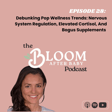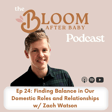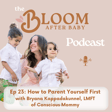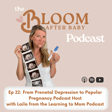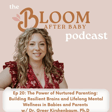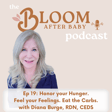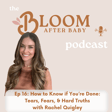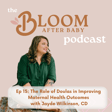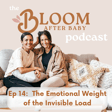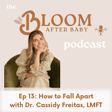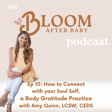
21. Breastfeeding & Postpartum Mental Health
We are chatting with Leora Robles, BS, IBCLC, about breastfeeding, the magic of breastmilk, and the importance of lactation support in postpartum (ideally, within the first couple of weeks following birth).
Leora supported Rachel through both of her breastfeeding journeys with her two babies, and can personally attest to the importance of working with an IBCLC for increased chances of a healthy, sustainable feeding journey, as well as optimal health and wellness for both mama and baby.
You're gonna learn:
- Why breastmilk is called liquid gold
- What kind of breastpump and breastfeeding pillow you need
- How to know how often and for how long to nurse your baby
- How to prepare for feeding your baby before baby comes
PS There is NO SHAMING or judgment of anyone who decides that breastfeeding is not for them, or who choose to, or have to, feed their baby in another way.
Here are some helpful resources mentioned in this episode:
Leora's instagram @breastfeed_oc
Website: www.breastfeedOC.com
Schedule a Consult, Group or Class: www.breastfeedoc.com/schedule
Leora provides: Private Lactation Consultations (Virtual and In-Person), Mamas Milk Club Breastfeeding Support Group, and Breastfeeding 101 – A prenatal breastfeeding class for expecting parents.
AND she takes insuranceI
You can learn more about Rachel's California-based group therapy practice and how you can work with her at www.racheldaggettlmft.com or on instagram @rachelscouch
Learn more about us and access all of our courses, coaching services, and free resources at bloomafterbaby.com or on instagram @bloomafterbaby
*Please note that this podcast is intended for educational purposes only, and is not a substitute for seeking individualized care from a mental health or medical professional*
Pregnancy tips Postpartum wellness Prenatal care New motherhood Postpartum recovery Maternal health Pregnancy journey Expectant mothers Postpartum support Motherhood experience Parenting advice Family dynamics Parenting tips Raising children Family well-being Parenting challenges Family relationships Parenting insights Mental health for mothers Emotional well-being Coping with motherhood Maternal mental health Self-care for moms Stress management Emotional resilience Conversations with experts Interviews with mothers Real-life parenting stories Expert advice for moms Support for new mothers Insights on motherhood Informative parenting discussions Working moms Health at Every Size Intuitive Eating Mindfulness Best Podcast Empowering mothers Couples therapy Psychotherapy Breastfeeding tips Sleep during pregnancy Postpartum nutrition Marriage and Family Marriage after baby Balancing work and motherhood Pregnancy self-care Healthy pregnancy habits Relationships Breastfeeding Working moms Breastmilk

